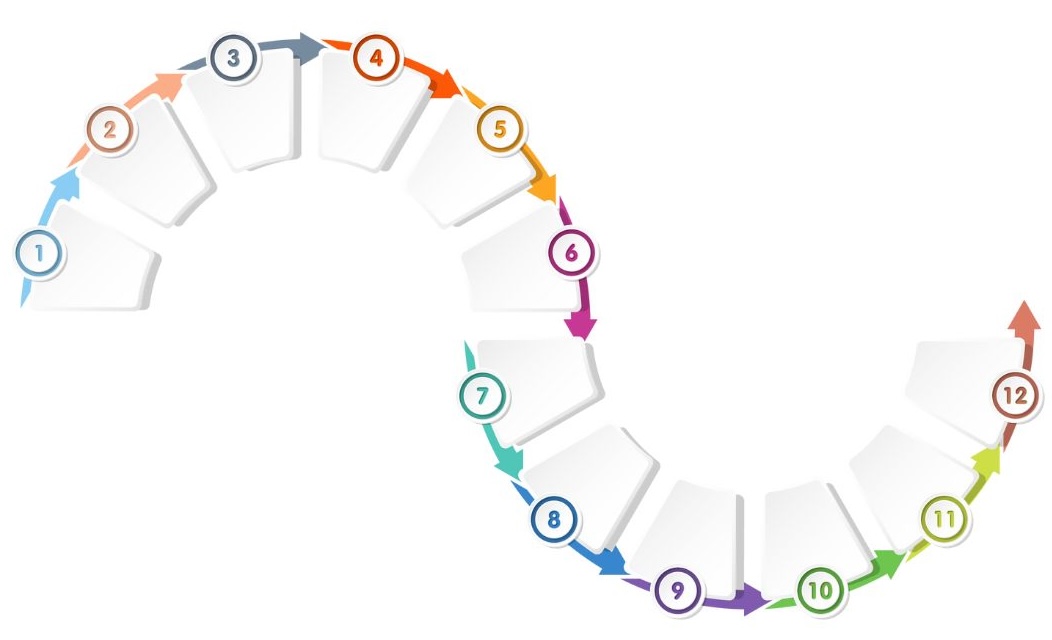What is the 12-Step Programme?
The 12-step programme provides addicted people with guidelines to help them replace addictive behaviours and thoughts. By following the motivation to overcome addiction, these steps can help you to implement a healthier routine, change unhealthy thought patterns, and reassess priorities, whereas lots of effort and support may be needed.

This program was originally created by the AA (Alcoholics Anonymous), but with its proven success is it now used to help people recover from other types of addictions, be they substance addiction or behavioural. The 12-step programme allows people to follow their own pace for each of the steps, but it is highly recommended that during the process, you attend regular meetings or counselling sessions for better results.
How does it work?
The focus of the 12-step programme is to achieve each step at once, but with techniques on building healthier patterns and routines for addicted people, it doesn’t hold a specific rule or a rigid system to achieve each step. It acknowledges each person may carry their own challenges and strengths, and therefore, through counselling and professional support, they can learn and grow from their experiences.
Please note that the 12-step programme may not be the best choice for everyone. Consult a counsellor or medical help before starting this journey.
What are the 12 steps?
The 12 steps to recovery, first published in 1939, may have been adapted, but its principles are still the same. They are:
- Accept the Reality: Recognising that you are helpless over your addiction and that change is required is the first step towards this programme. You may also be encouraged to believe in a higher force that can guide and heal you on your journey.
- Believe in a Higher Power: Step 2 then encourages the belief in this higher power and trust in its ability to guide and help you in this recovery journey. This power does not necessarily mean anything religious, but it is whatever you may define and make sense to you.
- Surrender to the Higher Power: Once step 2 is completed, step 3 consists of the fact that you cannot go on this journey alone and therefore you need the support and guidance from this higher power.
- Engage in Self-Reflection: Also referred to as a "moral inventory," step four involves self-reflection of your own actions to better understand how they may have affected you and those around you.
- Admit Your Faults and Failings: Once you acknowledge your possible impacts, step 5 encourages you to openly admit your mistakes and their effects, providing an opportunity for personal growth and a chance for a fresh start.
- Let It Go: Step 6 challenges you to let go of your past negative behaviours, and let go of your mistakes and effects.
- Practice Humility: Step 7 involves admitting that you cannot overcome addiction with simply motivation and that therefore, you may need to ask the chosen higher power for help.
- Show Readiness to Make Amends: Step 8 involves embracing the desire to make apologies to anyone you may have offended and writing down the names of those persons.
- Start Making Amends: Step 9 encourages you to actively start making amends with people in this list, and repairing the relationships where possible.
- Maintain Your Progress: During step 10, you should make spiritual advancements such as reflecting on yourself, owning up to your mistakes, and offering remedies where necessary.
- Seek Understanding and Purpose: The goals of Step 11 are to find your purpose in life, understand the plan that your higher power of choice has for you, and align your actions with this plan.
- Carry Forward the Message: Step 12, the final step, is a commitment to living by these principles in the aspects of your life and to encourage and assist those who are battling addiction by sharing the good news of recovery.
How Long Until the 12 Steps Programme Completion?
There is no exact amount of time for the 12-step programme completion. Each person has their own pace and there is no need to rush! While some people may complete the 12 steps in a few months, others may take years, and this is ok!
Giving yourself time to accept everything that has happened to you and making amends with it, is a complete personal journey and it may lead to a long-term recovery.
How do I Start The 12 Steps Programme?
Starting the 12-step programme on your own may be a big challenge, but with the help of recovery groups or rehab centres like New Leaf, the process can get smoother. A residential rehab centre has medical and therapists available that can walk you through the programme and help you to better understand each step.
We offer the 12-step programme introduction for patients who stay with us for at least 2 weeks, but from 28+ days of our residential treatment, we can delve deeper into the programme. That way, we can help them through the detoxification process, and start counselling sessions and group therapies, all together with the 12-step programme.
Contact New Leaf for a Residential Rehab in Birmingham
We understand that overcoming addiction is not an easy task, and accepting responsibility for choices made in the past may be even harder, but this is why New Leaf Recovery is here to help. Get in touch with us for a confidential chat and see how we can help you!

